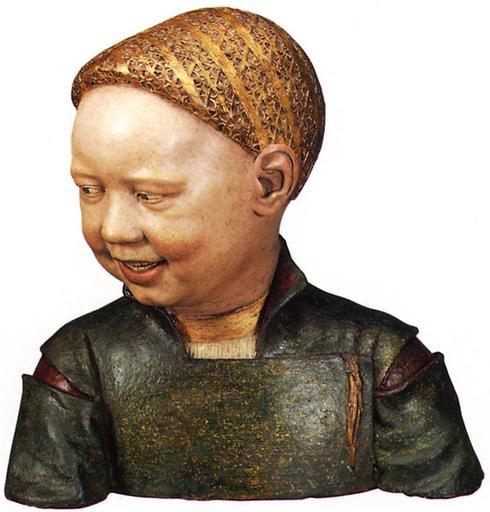MAKE A MEME
View Large Image

| View Original: | Bust_of_Henry_VIII_when_Duke_of_York.jpg (574x600) | |||
| Download: | Original | Medium | Small | Thumb |
| Courtesy of: | www.flickr.com | More Like This | ||
| Keywords: indoor people portrait Laughing child, possibly Henry VIII, c.1498 c.1498 Painted and gilded terracotta 31.8 cm high Perhaps commissioned by or presented to Henry VII This fragile bust seems to have remained in the Royal Collection since it was made. It is probably identifiable with the 'Head of a laughing boy' noted at Whitehall Palace in the reign of James II and in the Store Room at Whitehall Palace in an inventory made for William III; also with the 'Cast of a Chinese boy - laughing countenance' that was sent to Brighton Pavilion on 4 September 1815. It has subsequently been described as a laughing girl, a German dwarf, and as a portrait of Henry VIII (1491-1547) as a 7-year-old boy. In 1925 Lionel Cust, Surveyor of the King's Pictures and Works of Art, attributed the bust to the Modenese sculptor Guido Mazzoni, also known as Paganino. Mazzoni's surviving work consists almost entirely of life-size painted terracottas of the same strikingly realistic character, forming groups of the Nativity and Lamentation. A second, equally consistent mark of his work is a very high degree of technical proficiency, which is fully evident here. The bust was formed of clay pressed into a mould to a maximum thickness of 5 millimetres, and the boy's open mouth, ears and nostrils served to allow steam to escape during firing. Paint analysis was carried out in 1964 and in 1985-8, when the bust was cleaned, and nineteenth-century overpaint was removed from the child's tunic, revealing the original scheme - a green glaze over an incised layer of tin foil, perhaps intended to imitate cloth of gold. When Mazzoni was working on the tomb of the French King Charles VIII in Paris in the late 1490s, he submitted designs and an estimate for the tomb of Henry VII for Westminster Abbey, which were later rejected in favour of those by Pietro Torrigiano. The estimate does not indicate whether Mazzoni (who is called 'Master Pageny' in the English accounts) ever came to London, and no commission for the bust has come to light. Its identification as Prince Henry remains conjectural, supported only by its royal provenance and by the child's apparent age. Laughing child, possibly Henry VIII, c.1498 c.1498 Painted and gilded terracotta 31.8 cm high Perhaps commissioned by or presented to Henry VII This fragile bust seems to have remained in the Royal Collection since it was made. It is probably identifiable with the 'Head of a laughing boy' noted at Whitehall Palace in the reign of James II and in the Store Room at Whitehall Palace in an inventory made for William III; also with the 'Cast of a Chinese boy - laughing countenance' that was sent to Brighton Pavilion on 4 September 1815. It has subsequently been described as a laughing girl, a German dwarf, and as a portrait of Henry VIII (1491-1547) as a 7-year-old boy. In 1925 Lionel Cust, Surveyor of the King's Pictures and Works of Art, attributed the bust to the Modenese sculptor Guido Mazzoni, also known as Paganino. Mazzoni's surviving work consists almost entirely of life-size painted terracottas of the same strikingly realistic character, forming groups of the Nativity and Lamentation. A second, equally consistent mark of his work is a very high degree of technical proficiency, which is fully evident here. The bust was formed of clay pressed into a mould to a maximum thickness of 5 millimetres, and the boy's open mouth, ears and nostrils served to allow steam to escape during firing. Paint analysis was carried out in 1964 and in 1985-8, when the bust was cleaned, and nineteenth-century overpaint was removed from the child's tunic, revealing the original scheme - a green glaze over an incised layer of tin foil, perhaps intended to imitate cloth of gold. When Mazzoni was working on the tomb of the French King Charles VIII in Paris in the late 1490s, he submitted designs and an estimate for the tomb of Henry VII for Westminster Abbey, which were later rejected in favour of those by Pietro Torrigiano. The estimate does not indicate whether Mazzoni (who is called 'Master Pageny' in the English accounts) ever came to London, and no commission for the bust has come to light. Its identification as Prince Henry remains conjectural, supported only by its royal provenance and by the child's apparent age. | ||||